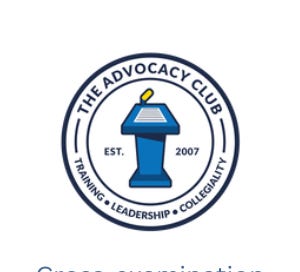Cross-examination Preparation #4 - Avoid the Question-Too-Many
It's easy once you know to watch for the risk
What have we learned so far about the techniques of cross-examination? Actually, quite a bit. First, we learned how the cross differs from the direct examination. And surprisingly, that is significant. How many times will an inexpert cross-examiner repeat the direct exam but in a loud and angry voice?
Second, we learned that the foundation of the successful cross is the little, bitty point. No, it may be a fact that doesn't matter all by itself. But, together with other little points, it may amount to a big score.
Third, we learned to combine the little points to make a big point. The one that does matter. So, yes, we've already come a long way.
When we get to the cross-examination itself – remember we are still in preparation mode – we will confront the live-action perils of a cross-examination. And rest assured, plenty can go wrong during a cross! But, for now, let's consider what can go wrong that you can plan for. There are several of these. We will cover a few others in our next episode.
The Big Kahuna is the dreaded 'question-too-many', the one that even accomplished cross-examiners ask more often than they would care to admit. The definition of the 'question-too-many' is up for grabs. Some counsel would say that is any question which allows the witness to argue the case for the opposing side. Most counsel would say it is the question that allows the witness to explain some inference that the cross-examiner has crept up to making with all those little points. Let's go with that one.
If you have established that the driver of the car had an appointment, that it was urgent, that there was little time left to make it, that the fate of the Free World depended on making it, that the red light was all that stood in the driver's way, then the 'question-too-many' would be this, "You were in a hurry, then, am I right?" To which the answer might well be, "No, I was not. I was aware of the urgency, but I consciously determined that nothing – absolutely nothing - was worth the risk of an accident. Your client came out of nowhere and struck my car, causing me great damage and loss, and it was not, repeat not, my fault." So there! Glad you asked it?
It's time again to prepare for the moment that opposing counsel puts Goldilocks on the witness stand. We have made the point – the Big Point – that we set out in the previous episode, Cross-examination Preparation #3. Let's figure out what the 'question-too-many' is. Once we know that, we can ensure it never pops out of our mouths!
For our Free Subscribers, we hope you have learned something valuable. We suggest you take this opportunity to sign up for a Paid Subscription to get full access to the balance of this and other posts.
Keep reading with a 7-day free trial
Subscribe to Advocacy Club Boot Camp on Substack to keep reading this post and get 7 days of free access to the full post archives.




